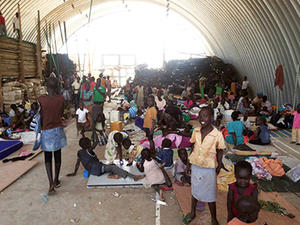African securityDeepening ethnic violence in South Sudan may ultimately tear the new country apart
Following last week’s announcement by President Salva Kiir of South Sudan that his government had foiled a coup attempt by his former vice president, Riek Machar, the country has been plunged into uncertainty. Escalating violence has already claimed hundreds of lives in the capital Juba. Thousands have fed the capital, seeking safety in remote rural areas of the country. Kiir belongs to the Dinka tribe which is the largest ethnic group in the country, with about 15 percent of the population. Machar is a Nuer, the second largest group with about 10 percent of the population. In the capital, Dinka-led South Sudanese forces have targeted members of the Nuer ethnic group, killing many and detaining others, including soldiers, lawmakers, and students. Outside the capital, in Jonglei State, Nuer militiamen have been targeting Dinka civilians and attacking oil fields.

South Sudanese refugees take shelter while fleeing civil war // Source: alhurra.com
Following last week’s announcement by President Salva Kiir of South Sudan that his government had foiled a coup attempt by his former vice president, the country has been plunged into uncertainty, with intensifying violence claiming hundreds of lives in the capital Juba.
Thousands have fed the capital seeking safety in remote rural areas of the country. The New York Times reports that the former vice president, Riek Machar, has denied any involvement in a coup attempt, and charged the Kiir is using the fabricated claims about a coup as a pretext to crack down on critics of the government.
Regardless of how the fighting has started, though, analysts note that the escalating violence has exposed simmering tensions among various groups in the new nation (South Sudan became independent of Sudan on 9 July 2011), tensions which may ultimately tear it apart.
“Today, that future is at risk,” President Obama said in a statement on Thursday. “South Sudan stands at the precipice. Recent fighting threatens to plunge South Sudan back into the dark days of its past.”
The violence is spreading. On Saturday, a U.S. aircraft sent to evacuate Americans came under fire, would four American soldiers.
South Sudan has never truly experienced peace in its shot history. Following the July 2011 declaration of independence, there was a relative calm in the country, but it was broken in December that year, as tribal clashes between the Nuer White Army of the Lou Nuer and the Murle intensified. The violence has continued, at different levels of intensity, ever since.
Machar, the former vice president who was dismissed over the summer is a Nuer, an ethnic group to which about b10 percent of the population belongs. The president belongs to the majority Dinka ethnic group – the largest ethnic group in South Sudan, with about 15 percent of the population.
The Times notes that in the capital, South Sudanese forces have targeted members of the Nuer ethnic group, killing many and detaining others, including soldiers, lawmakers, and students.
Outside the capital, in Jonglei State, the reverse has occurred as well, with Nuer militiamen targeting Dinka civilians. Nuer militants attacked UN compounds which sheltered thousands of Dinka civilians, and also attacked and partially destroyed oil facilities, leading to what the Security Council described as “the heavy loss of life” among workers.
“We are deeply concerned that ethnically based attacks on all sides will lead to revenge attacks and more violence,” Daniel Bekele, Africa director at Human Rights Watch, said in a statement.
Some analysts say the conflict is over politics, not ethnicity. “It is a power struggle,” Zacharia Diing Akol, an analyst at the Sudd Institute in Juba, told the Times. “Ethnicity is an afterthought.”
Kiir, the president of South Sudan, was the leader of the Sudanese People’s Liberation Army (SPLA), the militia which led to fight for South Sudan independence. Machar was a senior officer of the group, but in 1991, concluding that the SLPA was becoming a tool of Dinka interests, he split from the group to create his own, Nuer-dominated rebel militia. Six years later, in 1997, he signed a separate peace agreement with the Sudanese government in Khartoum, and his forces joined with the Sudanese army to fight their former SPLA comrades.
Five or six years later, however, Machar led his forces to abandon the cooperation with Khartoum and re-joined the SPLA in the fight for South Sudan independence. When South Sudan became independent, he was rewarded with the post of vice president.
On Friday, the UN Security Council issued a statement expressing “grave alarm and concern regarding the rapidly deteriorating security and humanitarian crisis in South Sudan resulting from the political dispute among the country’s political leaders, which threatens serious implications for the long-term security and stability of South Sudan, as well as for the neighboring countries and other peace and security challenges in the region.”
The escalating is already having an impact on the country’s fragile economy, with the main casualty being the country’s oil sector. The Chinese oil company CNPC, operating a few oil fields in the country, has begun removing its workers.
“In the coming days, refugees are likely to reach Uganda, Kenya and Ethiopia,” Casie Copeland of the International Crisis Group, told the Times. “South Sudan has become a critical player in the broader East African economy, with substantial regional and international investment.”
“The international community needs to double down on diplomatic engagement to facilitate a political resolution to the crisis,” said Akshaya Kumar, Sudan and South Sudan policy analyst at the Enough Project.
